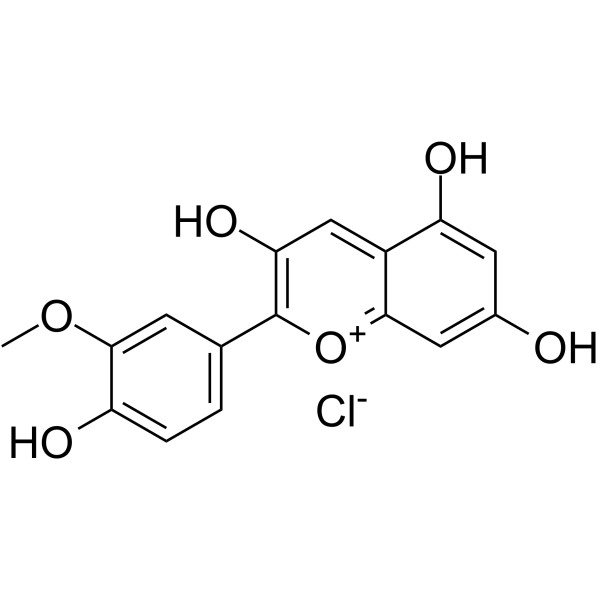
Peonidin chloride
CAS No. 134-01-0
Peonidin chloride( —— )
Catalog No. M31182 CAS No. 134-01-0
Peonidin chloride has antioxidant activity. Peonidin has show potent inhibitory and apoptotic effects on cancer cells in vitro, notably metastatic human breast cancer cells.
Purity : >98% (HPLC)
 COA
COA
 Datasheet
Datasheet
 HNMR
HNMR
 HPLC
HPLC
 MSDS
MSDS
 Handing Instructions
Handing Instructions
| Size | Price / USD | Stock | Quantity |
| 5MG | 358 | In Stock |


|
| 50MG | Get Quote | In Stock |


|
| 100MG | Get Quote | In Stock |


|
Biological Information
-
Product NamePeonidin chloride
-
NoteResearch use only, not for human use.
-
Brief DescriptionPeonidin chloride has antioxidant activity. Peonidin has show potent inhibitory and apoptotic effects on cancer cells in vitro, notably metastatic human breast cancer cells.
-
DescriptionPeonidin chloride has antioxidant activity. Peonidin has show potent inhibitory and apoptotic effects on cancer cells in vitro, notably metastatic human breast cancer cells.
-
In Vitro——
-
In Vivo——
-
Synonyms——
-
PathwayOthers
-
TargetOther Targets
-
Recptor——
-
Research Area——
-
Indication——
Chemical Information
-
CAS Number134-01-0
-
Formula Weight336.7
-
Molecular FormulaC16H13ClO6
-
Purity>98% (HPLC)
-
SolubilityIn Vitro:?DMSO : 100 mg/mL (296.98 mM)
-
SMILES——
-
Chemical Name——
Shipping & Storage Information
-
Storage(-20℃)
-
ShippingWith Ice Pack
-
Stability≥ 2 years
Reference
molnova catalog



related products
-
EC330
EC330 a novel steroidal LIF inhibitor showed cytotoxicity in various cancer cell lines and NCI-60 cell line panel at low nano-molar range.
-
Metyrapone
Metyrapone is an inhibitor of cytochrome P450-mediated ω/ω-1 hydroxylase activity and CYP11B1.
-
3-Methyl-2-buten-1-o...
Prenol is found in blackcurrant. Prenol is a constituent of ylang-ylang and hop oils. Prenol is found in orange peel oil and various fruits e.g. orange lemon lime grape pineapple purple passion fruit loganberry etc. Prenol is a flavouring ingredient



 Cart
Cart
 sales@molnova.com
sales@molnova.com


